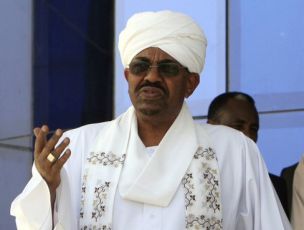Sudan’s president Al-Bashir might vie in next elections, his party says
April 22, 2011 (KHARTOUM) – Sudan’s President Omer Al-Bashir will run for presidency in next elections at his party’s discretion, an official said on Friday, dousing earlier assertions that the 21-year-ruling leader will not seek another spell in power.

“[Bashir] announced that he will not enter the coming elections to compete for the presidency,” Rabie Abdel-Aati, a senior National Congress Party official, was quoted by news agencies.
“I can confirm 100 percent that Bashir is not going to run for president in the next election. He will actually give a chance to different personalities to compete for the position,” Abdel-Aati said. “But he is not under pressure… This is not in the context of the change that is happening in the Arab world. It is happening because of the political strategy of the NCP to broaden participation,” he added.
But the NCP’s Vice-President Nafi Ali Nafi on Friday contradicted his colleague’s statement, raising the possibility of his party fielding Al-Bashir as a presidential candidate in 2015 elections.
“I know that Al-Bashir has no desire to run again, however, our work is not subject to people’s desires, but rather to what the organization sees,” Nafi said in a radio interview on Friday, adding that asking Al-Bashir to vie in next elections was definitely a possibility if the NCP sees so.
Sudan held general-elections in April 2010 under the provisions of the Comprehensive Peace Agreement (CPA) which ended in 2005 nearly half a century of intermittent civil wars between north and south Sudan, which also voted in January to secede and form an independent state in July this year. The NCP won a landslide victory and Al-Bashir was re-elected in the vote which was marred by opposition boycotts and reports of mass fraud.
Separately, the hard-line NCP official said that the opposition National Umma Party (NUP) might join the current government if a “limited number” of issues are agreed upon, including the issue of the International Criminal Court (ICC) which the NUP views as a legitimate judicial body, according to Nafi, as well as reduction of the country’s states to six provinces.
The NUP leader and former Prime Minister, Al-Sadiq al-Mahdi, said this week that points of disagreements in his party’s dialogue with the NCP would be referred to a “decisive” meeting with Al-Bashir.
Al-Mahdi has consistently defended his decision to engage in a dialogue with the NCP despite dissatisfaction within the NUP’s ranks and calls by his allies in the opposition coalition for political mobilization to topple the regime.
He asserts that his party is negotiating over a raft of demands he terms as “the national agendas”, including a solution to the ICC which is seeking the arrest of Al-Bashir on charges of war crimes, crimes of humanity and genocide allegedly committed in the country’s westernmost region of Darfur.
The NCP and Al-Bashir refuse to comply with the ICC’s warrants of arrests, repeatedly denigrating the court as a western conspiracy to change the regime in Sudan.
(ST)
